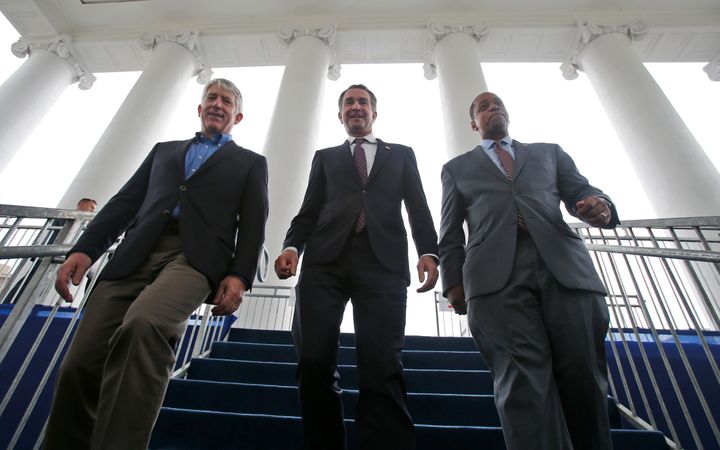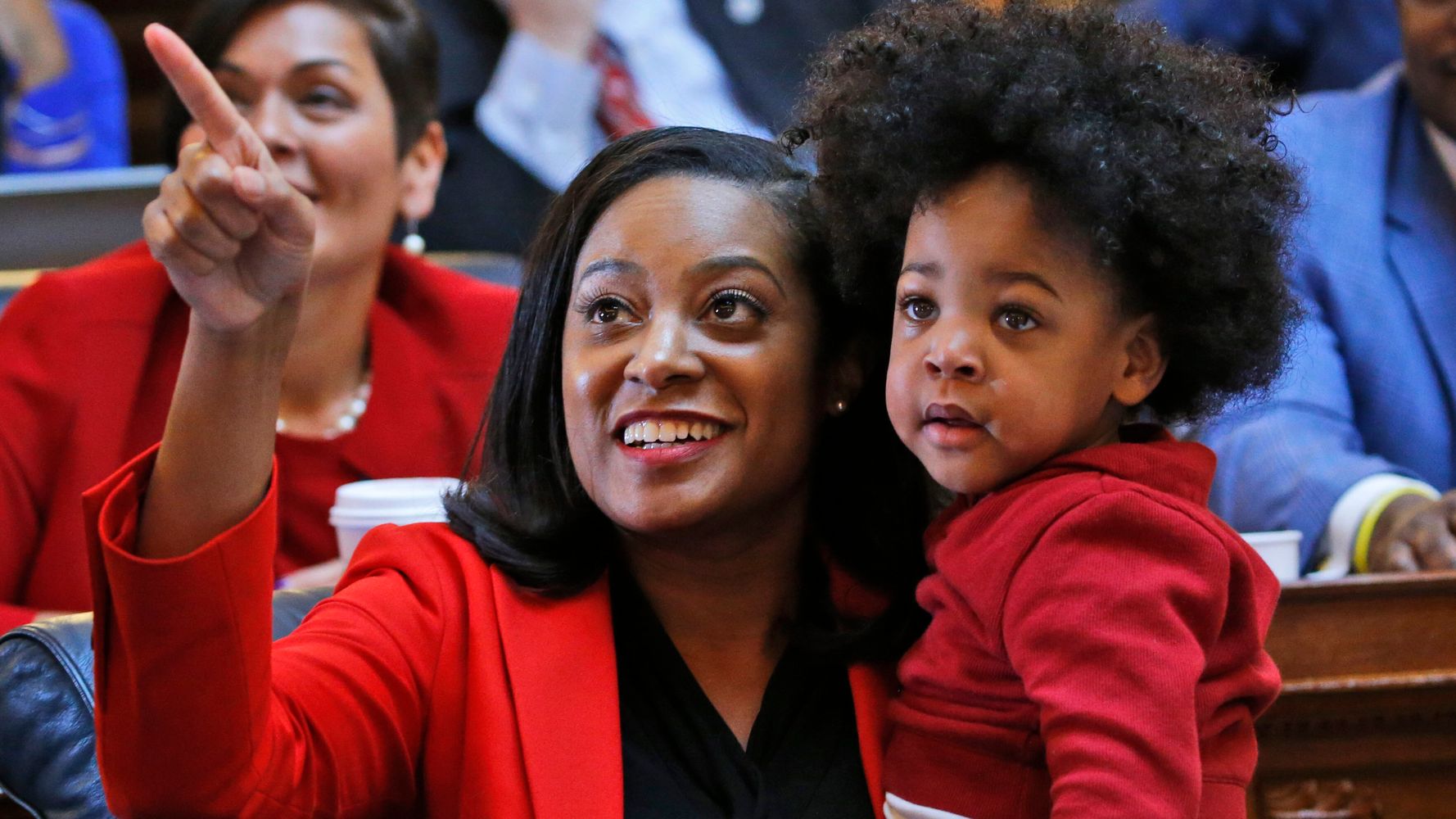[ad_1]
Jennifer Carroll Foy is jumping into the 2021 gubernatorial race in Virginia, making her the first Black woman to run for the job in 30 years. If elected, she would be the first Black female governor anywhere in the country.
“I look forward to being more bold in what we get done here in Virginia, especially dealing with everyday, kitchen table issues,” Carroll Foy, a 38-year-old state delegate, said in an interview with HuffPost.
The election of Carroll Foy would be a dramatic move, cementing the new blue, diverse character of the state that once was the capital of the Confederacy.
Virginia has never had a female governor. Democrat Douglas Wilder, who served 1990-1994, is the only Black person elected to the job in the state.
Carroll Foy is considered a dynamic rising star in Virginia politics. She grew up in Petersburg ― about 30 miles south of Richmond. After the Supreme Court forced the Virginia Military Institute to start accepting female cadets in 1996, Carroll Foy received a full scholarship to attend college was part of the third class of women to graduate ever.
She became a public defender and was elected to the General Assembly in 2017.
Carroll Foy has made her mark in office by leading the fight to ratify the Equal Rights Amendment as the chief sponsor in the state House.
In January, Virginia became the 38th state to ratify the provision, which guarantees equal protection for women. There will now be a legal battle about whether Virginia’s vote means that the ERA can be added to the U.S. Constitution.
Passage of the ERA was a central campaign promise for many Democrats when they swept control of the state legislature in 2019.
Launching a campaign in the middle of a pandemic likely isn’t what Carroll Foy had planned. But, she said, her priorities haven’t changed.
“I’ve been fighting for the issues that COVID-19 has exposed for other people since day one,” she said. “I’ve always been fighting for increasing the minimum wage and paid sick days, paid family medical leave and ending pregnancy discrimination. All of these issues have lent itself to bear doing this pandemic.”
Carroll Foy praised the job Gov. Ralph Northam (D) ― who cannot run again because of term limits ― has done, but said there are areas where she’d like to be “bolder.” She pointed to making sure all bus drivers and grocery workers have masks and personal protective equipment, raising the minimum wage, implementing paid sick days and instituting a vote-by-mail system.
“Campaigning during a global pandemic is a challenge in and of itself. … Now that doors are closed ― and we don’t know the next time we’ll be able to knock on a door ― we have to turn our attention to where we can meet people where they are. And the best way to do that is through social media, through digital and through the mail,” she said.
I stand on the side that we are No. 1 in the country for businesses. But we can also be No. 1 in the country for workers.
Virginia state Del. Jennifer Carroll Foy
Carroll Foy is a former foster mom and mother to twin boys. She became pregnant during her campaign and was frequently asked how she could manage both motherhood and a career ― with people suggesting she should choose just one.
In office, Carroll Foy has introduced anti-pregnancy discrimination legislation and a bill requiring school boards to write their dress codes in a way that eliminate gender and racial discrimination.
“Being born in Petersburg and raised by my grandmother, I remember at a young age, sitting down at my dining room table with my aunt after my grandmother had a stroke and became a quadriplegic, having to decide if we were going to pay for our mortgage that month, or for the medications keeping my grandmother alive. And as a mother of twins, I don’t want my children or anyone’s children to have to make those type of impossible decisions,” she said, adding, “I’ve dedicated my entire life to fighting for those who cannot fight for themselves, and I will continue to fight as the next governor of Virginia.”
Carroll Foy is likely going to face a number of challengers for the Democratic nomination next year. Attorney General Mark Herring, former Gov. Terry McAuliffe, Lt. Gov. Justin Fairfax, state Sen. Jennifer McClellan and Richmond Mayor Levar Stoney have all expressed interest in running. (McClellan is African-American and would also make history if she won.)
On the GOP side, state Sen. Amanda Chase is the only declared candidate. She’s a fervent supporter of President Donald Trump and has decried “the liberal, socialistic agenda that has taken control of the Capitol.”
Herring and Fairfax, who were considered leading contenders for the top job, have been beset by scandals.

Herring admitted that he wore blackface at a college party in 1980. His comments came after a racist photograph on Gov. Northam’s medical school yearbook page surfaced. Northam said he was in the picture, but then he retracted his admission.
Last year, two women accused Fairfax of sexual assault in the early 2000s. He has denied the allegations.
“I believe that women should be believed, and I believe they should be heard,” Carroll Foy said. “And as the next governor Virginia, I hope to create a climate where women feel empowered to come forward to tell their stories.”
“While controversies may be happening around me,” she added, “I was focused on passing Medicaid expansion for 400,000 Virginians, ratifying the Equal Rights Amendment for women’s equality, carrying paid family medical leave, ending pregnancy discrimination here in Virginia and reforming our criminal justice system in a way that’s unrecognizable so everyone is treated fairly and equitably.”
One area where many progressives were disappointed with the Democratic-controlled state legislature recently was its failure to repeal the state’s right-to-work law. These anti-union laws forbid employers from forcing all their workers to pay union dues. This arrangement means that some people get all the benefits of representation without having to contribute anything.
While some people may decide not to pay because they are against the union, others may simply stop giving money because there’s little financial reason to do so if the union is obligated to provide representation anyway.
The repeal bill failed to pass out of the General Assembly, but Northam also made clear he believed the legislation was unrealistic and had no interest in signing it.
Carroll Foy, however, supported the repeal bill and said she would sign it if it came to her desk when she was governor.
“If it is the will of Virginians, if it is the will of the body and the General Assembly, then I will be happy to put pen to paper to sign that,” she told HuffPost.
The human rights group Oxfam has ranked Virginia dead last in its ranking of the “best places to work in America.” States with right-to-work laws have wages that are, on average, 3.1% lower than pro-union states, according to a 2015 study by the liberal Economic Policy Institute.
“I stand on the side that we are No. 1 in the country for businesses. But we can also be No. 1 in the country for workers,” Carroll Foy said. “And our economy is working very well for the very wealthy, but it’s not for those people who are working two to three jobs and still living paycheck to paycheck. And there’s been a concerted effort to end unions and labor here in Virginia, even though they are the other reason that we have weekends, we have minimum wage pay, we have child protection. They were the way that we got to the middle class.”
Carroll Foy said she was encouraged by the March 3 presidential primary in the state, which saw historic turnout, and hoped that it meant good news for Democrats in November.
“What that says to me is that people are motivated and people want change,” she said. “They want to do something different than what is currently happening in the White House, and they will come out in historic numbers in order to make that happen.”
Calling all HuffPost superfans!
Sign up for membership to become a founding member and help shape HuffPost’s next chapter
[ad_2]
Source link

